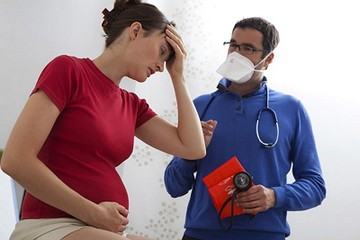Fifths Disease And Pregnancy

Contents:
- Fifth Disease (Parvovirus B19) During Pregnancy
- What Virus Causes Fifth Disease and Where it Can Infect?
- Disease Symptoms
- Why the Parvovirus is Dangerous to Pregnant Women?
- Methods of Diagnostic and Treatment Which Are Used in Parvovirus Infection
- Infection Prevention
Fifth Disease (Parvovirus B19) During Pregnancy
Fifth disease or infectious erythema is the widespread viral disease which is an often defining symptom of the infection in children of preschool and younger school age. Sometimes this illness is also referred to as «slapped cheek syndrome», as its vivid indication is bright red rash most commonly appears in the face, which can extend to the neck and the limbs.
Fifth disease proceeds not always easily, it can sometimes provoke development of serious hemolitic anemias, arthritises, aplastic crises and arthropathies of varying severity. This disease is also dangerous for pregnant women because it, in 10-15% of cases, leads to fatal pathology of fetus.
What Virus Causes Fifth Disease and Where it Can Infect?
Fifth disease is manifestation of infection by so-called parvovirus B19.
It may be transmitted through the air i.e. through snot mucus or saliva therefore it may have been got:
- staying in the same room with sneezing or coughing people;
- at common everyday contacts (through the same plates, door handles and so on);
- through kissing;
- through unclean hands.
On entering an organism the parvovirus B19 suppresses formation of erythrocytes (red blood cells). As a rule, the disease lasts a short time (5-7 days) therefore the short-term termination of synthesis of erythrocytes doesn't do essential harm to most of healthy people. However, for adults and children including not yet born ones, which have some chronic diseases, severe forms of anemia and immunodeficiency, this virus can be deadly.
Disease Symptoms
Manifestations of fifth disease depend on the immune system state.
The disease can proceed in an asymptomatic form, but it may also have the following signs:
- in the beginning in patient may be observed low-grade fever, weakness, feeling sick, decrease of blood hemoglobin and reticulocytes level;
- in the second phase bright red rash appears on the cheeks. Occasionally the rash will extend over the rest of the body. Specific antibodies accrue in blood. The patient may complain about joint pain, neck and throat pains, runny or stuffy nose, headache, diarrhea, conjunctivitis.
All stages of the infection proceed in adults much more sharply, than in children. Rashes disappear, as a rule, in 1-2 weeks. Unpleasant feelings in joints can proceed longer and to appear periodically within several months, or sometimes in the course of years.
Why the Parvovirus is Dangerous to Pregnant Women?

The parvovirus B19 relates to one of the most known infections which may be found at arrest of fetus development. Statistically, during pregnancy approximately in 25-50 % of cases the parvovirus gets into fetus from the infected mother's organism through placenta. Fortunately, in most of children this disease doesn't develop and doesn't cause fetal anomalies.
However in certain cases fifth disease can provoke the following disorders in fetus development:
- hypoxia;
- severe form of anemia;
- edema;
- inflammation of a cardiac muscle (myocarditis).
Besides, there is a risk of spontaneous miscarriage and fetal death. It can occur at any stage of the disease. The risk for fetus life in the second trimester is highest because of development of proerythroblasts which gives rise to basophilic erythroblasts of blood during this period. Perilous losses may occur in the 3rd trimester. But during the first weeks of pregnancy it occurs very seldom.
Methods of Diagnostic and Treatment Which are Used in Parvovirus Infection
During pregnancy a laboratory method is used to identification of parvovirus B19. That is so-called serological survey which includes enzyme-linked immunosorbent assay (ELISA) based on determination of level of specific antibodies IgM and IgG.
It is necessary if the woman:
- contacted to patients (in this case antibodies can be defined only in 2 months after the contact);
- complains about unpleasant sensations similar to symptoms of the disease.
Besides, differential diagnostics is performed in such diseases as rubella, allergies, dermatitis, SARS, pseudorheumatism, measles, etc. Ultrasonography and Doppler sonography are used to be applied for the assessment of fetus health state. At suspicion of fetus infection the doctor can appoint cordocentesis.
The following signs allow the experts to detect the disease in children:
- existence of specific IgM in umbilical blood or in blood of the newborn baby;
- specific IgG determined in blood of the child aging over 1 year.
Today drug treatment of parvoviral B19 infection aren’t applied. In case of identification of edema in fetus, experts can make the decision to carry out further fetal hemotransfusion
Infection Prevention
It is impossible to exclude risk of parvoviral B19 infection completely as the disease often proceeds asymptomatically. But it is possible to reduce probability of contact with an activator.
For this purpose it is needed to follow the next simple rules:
- you shouldn't visit crowded places during pregnancy;
- it is necessary to wash hands as often as possible;
- you shouldn't use the same tableware with other people;
- it is recommended to eat fully, to walk often and to take vitamin complexes for stimulating immunity system functions.
Besides, it is the best of all to undergo examination for parvovirus B19 antibodies detection along with standard screening with the object to infection revealing even before pregnancy planning. And of course you shouldn't forget to tell about unusual sensations and painful feelings to your doctor. He will be able to help you to prevent serious problems timely even while upon infection.